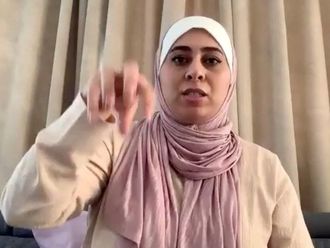Ramallah: It had been almost a decade since a colonist attack on the tiny West Bank village of Yanoun forced almost the entire population of 63 to flee to nearby Aqraba.
But the memories must have been fresh last weekend when a clash between settlers and farmers in fields around the village turned into a riot in this idyllic corner of the West Bank.
However, by the end of the day six Palestinians had been stabbed, shot or beaten, five of them ending up in hospital. Meanwhile one Israeli colonist from Itamar — the Israeli colony that surrounds Yanoun on three sides — suffered a broken arm.
A witness told Gulf News that the violence started after a group of armed colonists crossed into Palestinian land and killed three sheep belonging to a local farmer. In the protest that ensued — bringing hundreds of locals from surrounding villages — one Palestinian was shot in the arm, another was beaten up, bound and left in a field overnight.
Jane Harries, a volunteer with EAPPI who lives in Yanoun, visited one of the men in hospital following the attack, and said that despite their injuries, their biggest worry is not being able to get back on their land.
“This is the main worry of the local population — that this incident will mean that another piece of land will be closed to them,” said Harries. “And their fear is real. Possession of this land would enable the settlers to link up the colony of Itamar to the Jordan Valley.”
Yanoun’s picturesque location in the hills above the Jordan Valley is also its curse. The village is the last piece of land between Itamar and the valley below, which is the source of most of the West Bank’s water and heavily controlled by Israel. When I visited Yanoun in May this year, Rashid, the village’s 46-year-old mayor, expressed the fear that attacks were an effort to drive Palestinians away gradually until no farmland is left.
Speaking to the EAPPI on Wednesday, Rashid repeated his concerns, expressing the fear that colonists initiated the clash to enforce new invisible boundaries, which would defacto confiscate much of the area’s wheat fields to the Itamar colony.
Yanoun is reliant on wheat production for its survival, and a lack of farming land has already driven much of the village’s young population to Akraba and Nablus, 12km away.
Not only are Israeli colonies illegal under the Geneva Convention, but Israeli soldiers are — under the same law — required to protect civilians under attack in areas that they occupy.
The International Court of Justice upheld this ruling in 2004, but colonist violence has continued throughout the West Bank, often, witnesses say, under the eye of the IDF. Indeed, the EAPPI said that soldiers not only failed to act in the face of the violence against Arab villagers, but actually took part in it.
This is a fact that is heavily disputed by Moshe Goldsmith, the de-facto mayor of Itamar, who told Gulf News by phone that soldiers and colonists had acted proportionately. He said that a group of colonists had been enjoying a day out near a spring when they were set upon by Palestinians, who started fires and threw stones. Goldsmith said he did not know whether the colonists were armed.
“Most of the people in Itamar carry firearms but… they try to avoid trouble. [On this occasion] their lives were threatened. It’s a miracle that they got away,” he said. “We have no problem with the village of Yanoun, most of the trouble is started by troublemakers from other villages nearby.”
For the villagers still recovering in the West Bank however, discussion of the ruling of a foreign court or the culpability [or not] of Israeli troops is little comfort. Harries says that life goes on in Yanoun, and few expect any legal redress from either Israel — who has responsibility for civil administration and policing in Yanoun — or the Palestinian Authority.
“Village life goes on with the usual resilience,” Harries says. “Complaints have been filed with the Palestinian District Commanding Officer, but there is little real hope that this will bring any results with the Israeli authorities.”
Villagers, meanwhile, are far more concerned with the immediate problems. Jawdat, one of the men who was beaten by colonists on July 7 and whose family home in the valley predated 1948, exclaimed with desperation: “I have 700 sheep. Where are they supposed to go?”
Orlando is a journalist based in Ramallah












